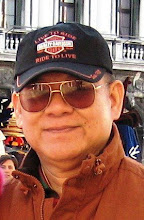I had probably watched the thriller movie, 'Shooter', on DVD more than half a dozen times.
In fact, I had watched it again a few weeks ago.
The exciting story centred on how a retired US Marine scout-sniper, Bob (played by Mark Wahlberg) was hook-winked and double-crossed by a high-powered rogue group led by an enigmatic Colonel Johnson (played by Danny Glover), in collusion with a mysterious senator in deep cover within the US government establishment, to take on a seemingly patriotic assignment, with the objective of flushing out a known assassination attempt on the US President.
At the end, he escaped and eventually tracked down and neutralised all the bad guys, with the unlikely aid of a disgraced FBI agent, Nick (played by Michael Pena).
Naturally, as in most Hollywood movie productions, a beautiful woman also got dragged into the web of intrigue, serving unfortunately more as eye candy.
 As a matter of fact, many nights earlier, I had also watched another thriller movie, 'Enemy at the Gates', on DVD about a deadly cat and mouse game between a Russian sniper (played by Jude Law) and a German sniper (played by Ed Harris) at the tail end of the Battle of Stalingrad.
As a matter of fact, many nights earlier, I had also watched another thriller movie, 'Enemy at the Gates', on DVD about a deadly cat and mouse game between a Russian sniper (played by Jude Law) and a German sniper (played by Ed Harris) at the tail end of the Battle of Stalingrad.Several years ago, I had also watched the thriller movie on cable television in Singapore, 'Sniper', followed by its two subsequent sequels, 'Sniper 2' and 'Sniper 3'. Tom Berenger had played the US Marine sniper veteran featured in all the three movies.
 In a nut shell, somehow I seem to have this unquenchable fascination for watching snipers at work, even though they were conceived in the minds of creative Hollywood producers.
In a nut shell, somehow I seem to have this unquenchable fascination for watching snipers at work, even though they were conceived in the minds of creative Hollywood producers.Well, for me, I always hold the view that reel life reflects real life, and vice versa. That's why whenever I sit down to watch a movie, I always make it a point to mine and extract my learning experience from the movie beyond the entertainment perspective.
I have read that real-world snipers actually work in team of two, as depicted in the movie, 'Shooter'.
What actually fascinates most is the skills repertoire of the scout-sniper, which comprises:
- the mental skills, especially the ability to think ahead (I call it "anticipatory prowess", as depicted by Bob in the movie), and to look at the situation critically;
- the patience to wait for the perfect opportunity to fire upon a selected target;
- the ability to "neutralise" environmental distractions; and, more importantly,;
- the ability to manage the countless mathematical variables in the head, about wind speed, wind direction, range, target movement, mirage, light source, barometric pressure, temperature and even the earth's rotation (that's why he works with a spotter in a sniper team);
- the physical discipline and survival skills;
- the observation, reconnaissance and surveillance skills, especially the ability to catch the slightest "unnatural disturbances" in the environment around them;
- the camouflage skills, to avoid detection and staying alive;
- the stalking and infiltration skills, including stealth adeptness as well as the ability to adapt and improvise with whatever resources at hand;
on top of the clever marksmanship with tactical weapons and a precise understanding of ballistics.
Interestingly, I read that marksmanship accounts for only 10% to 20% of their overall skills repertoire.
The skill and the power of observation are rated very highly.
While digging through the net for information on scout-sniper training, I found the following interesting games as part of their observational skills training, known as the KIMS game:
It goes something like this.
A number of different objects are placed randomly on the table: a bullet, a paper clip, a bottle top, a pen, a piece of paper with something written on it.
They may be 10 to 20 items.
Trainees are given a minute or so to look at everything on the table.
Then, they have to go back to their desks & describe what they saw.
They are not allowed to say "paper clip" or "bullet".
They have to say, like, "silver, metal wire, bent in two oval shapes."
In other words, the training requires you to observe the objects more closely or critically.
The foregoing game is repeated with more objects to look at and with less time to look at them.
To add to the challenge, the time between seeing the objects and describing what is seen gets longer as the scout-sniper training goes on.
By the end, they may see 25 objects in the morning, train whole day, and then at night be asked to write down descriptions of all the things they saw in the morning.
Another observation skills training happens in the field with a sniper scope.
What they are required to do is to scope out random but hidden objects in a field.
For me, this intense observational practice is intriguing.
Now, I can understand how all these observation training manoeuvres eventually help the scout-sniper to function superbly with stalking, infiltration, and reconnaissance manoeuvres in the field under dicey circumstances.
I reckon the same acute observational skills of a scout-sniper can also readily apply in the skills repertoire of today's business professional, except for the "one-shot, one-kill" score.
To be able to spot opportunities, a business professional today must exercise active and intense observational skills in novel situations as well as in ordinary encounters, besides a substantial dosage of personal creativity and a broad network of contacts.

















No comments:
Post a Comment